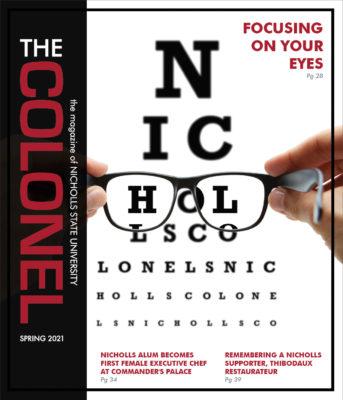
Where we were, where we are, where we can be
Several months ago, I responded to a survey request from the Nicholls Alumni Federation. My response was about experiences I had as the first African-American athlete at Nicholls State University. The response was solicited in the aftermath of the George Floyd death at the hands of police officers in the Minneapolis Police Department. I would like to take this opportunity to expand on the response I gave.
I was offered a scholarship and recruited to play basketball at Nicholls in 1968. I encountered numerous negative experiences, especially in my first three years on campus. There were two acts of blatant racism directed at me and several acts of what we now call micro-aggressions. One of the blatant acts of racism involved a white student making claims that other Black students were calling me names like Uncle Tom. His claims were directed at me very loudly in the cafeteria on at least three occasions. What I found out later was that this student was trying to instigate a fist fight between other Black students and me, an incident which would have gotten them, and myself kicked out of college. Fortunately, I learned later that the late Dean William Duncan had found out about other acts the student was fomenting and dismissed him from the university. The other act of blatant racism I will talk about later. For now, I will say it was a teammate who called me n… the N-word to my face.
It was the acts of micro-aggressions that I want to talk about because, believe it or not, it was those acts that have the greatest lasting impact on my emotional well-being. The analogy that I compare micro-aggressions to is waterboarding. A single drop of water that hits you between the eyes over and over and over can be devastating. It was for me, to the extent that for two years after I received my bachelor’s degree, my anger level grew and grew to a point where I was not a pleasant person to be around. The result was increased anxiety and poor sleep habits.
The turning point came for me in 1974. I had joined the Army two months after leaving Nicholls. I served about two years at Fort Polk, Louisiana. In 1974, I was then transferred to Fort Greeley, Alaska. One Sunday morning I was reading the Seattle Post and I ran across an article that proved to be a great therapy for me. A white man wrote and I am paraphrasing,
“I was car jacked, shot and thrown out of my car on the side of an interstate highway by a Black man. Some might wonder, why I do not hate Black people. Well the rest of the story is that it was another Black man who found me, put me into his car, drove me to the hospital, called my family members and stayed with me until they arrived. He basically saved my life. So, I learned from that experience to not focus on the Black man who did me harm, but to focus on the one who saved my life.”
Sure, there were those who directed acts of micro-aggressions toward me, but if I had chosen to continue to focus on them there is no telling what it would have done to me physically and mentally. I began to, and have continued to, try hard to focus on the decency of people. To be sure, even decent people have faults, but it is instructive to focus on their good points, not their faults.
I can look back on those years and now focus on the decency of teammates like Danny Smith, Larry Crist, Ken Seibold and others. I remember the humanity of my freshman basketball coach, Stan Beaubouef, and the kindness he showed to me. I would be remiss if I did not mention Don Landry, my head coach, and Tiger LeBlanc, his assistant, and how they went out of their way to be fair and kind. Faculty members like Drs. Merlin Ohmer, Tom Becnel and Paul Leslie stand out in my memory for the humanness they showed toward me.
And finally, the teammate who called me the N-word in 1969 formally apologized to me in 2016, some 47 years later.
The late 1960s and early 1970s as it is in 2020 was a time of great change in our country. However, the great lesson I learned in 1974, to focus on the decency of good people and to try as best we can to not elevate those who are hate-filled, giving them undeserved attention, is still a good lesson to live by.
– Dr. Cleveland Hill (BA ’73, MEd ’79)


Our Venerable Tradition
Illustration By Sharon Doucet (BA ’78) “Tradition,” wrote Friedrich Nietzsche, “grows continually more venerable.” That’s easy to understand, but for the iconoclast Nietzsche it was


Where we were, where we are, where we can be
Several months ago, I responded to a survey request from the Nicholls Alumni Federation. My response was about experiences I had as the first African-American athlete at Nicholls State University.


Woolsthorpe Manner
Illustration by Sharon Doucet (BA ’78) Woolsthorpe Manner Springtime on Earth is always a special time in the universe. It was in the springtime of



